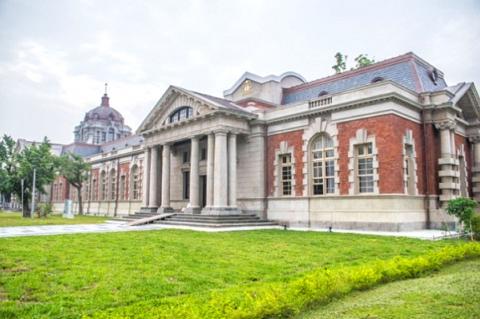Judicial Yuan President Hsu Tzong-li (許宗力) said he hoped an exhibition at the site of the former Tainan District Court would teach the public about the importance of the rule of law.
Hsu made the remarks while attending a ceremony on Tuesday to mark the completion of the site’s renovation. The exhibit features judiciary-related writings, historical documents, photographs and other materials.
Designed by Japanese architect Matsunosuke Moriyama and opened in 1914, the building was designated a national heritage site in 1991. It is seen as one of three buildings constructed in Taiwan during the Japanese colonial period that are classics of that era, along with the Presidential Office Building in Taipei and the building which now houses the National Taiwan Museum.

Photo: CNA / Tainan District Court
The tower to the west of the building had started to lean due to sinking foundations, and cracks could be seen on its exterior. It was removed after National Cheng Kung University professors assessed the building and deemed it to be dangerous.
The building has undergone 13 years of restoration efforts with certain sections dismantled and restored with the aid of archeologists.
With its restoration complete, the building will be host to a variety of exhibits and events, detailing the building’s history, the changes in the local area, architectural uniqueness and an exhibit on the restoration efforts itself, the Tainan City Government said.
Hsu said he hoped the conservation of the building would aid in passing on “our history,” and serve as a bridge between the judiciary and the people.
While the Judicial Yuan hopes to turn the site into a “museum of justice,” Tainan Mayor William Lai (賴清德) said he hopes the site could be turned into the city’s “museum of history” and that the management of the site would be turned over to the city government.
No consensus has been reached between the two parties.

US President Donald Trump said "it’s up to" Chinese President Xi Jinping (習近平) what China does on Taiwan, but that he would be "very unhappy" with a change in the "status quo," the New York Times said in an interview published yesterday. Xi "considers it to be a part of China, and that’s up to him what he’s going to be doing," Trump told the newspaper on Wednesday. "But I’ve expressed to him that I would be very unhappy if he did that, and I don’t think he’ll do that," he added. "I hope he doesn’t do that." Trump made the comments in

NOT AN OPENING: Trump’s violation of international law does not affect China’s consideration in attacking Taiwan; Beijing lacks capability, not precedent, an official said Taiwanese officials see the US’ capture of the president of Venezuela as a powerful deterrent to Beijing’s aggression and a timely reminder of the US’ ability to defeat militaries equipped with Chinese-made weapons. The strikes that toppled Venezuelan President Nicolas Maduro signaled to authoritarian leaders, including Chinese President Xi Jinping (習近平), US President Donald Trump’s willingness to use military might for international affairs core to US interests, one senior official in Taipei’s security circle said. That reassured Taiwan, the person said. Taipei has also dismissed the idea that Trump’s apparent violation of international law could embolden Beijing, said the official, who was not

A cold surge advisory was today issued for 18 cities and counties across Taiwan, with temperatures of below 10°C forecast during the day and into tonight, the Central Weather Administration (CWA) said. New Taipei City, Taipei, Taoyuan and Hsinchu, Miaoli and Yilan counties are expected to experience sustained temperatures of 10°C or lower, the CWA said. Temperatures are likely to temporarily drop below 10°C in most other areas, except Taitung, Pingtung, Penghu and Lienchiang (Matsu) counties, CWA data showed. The cold weather is being caused by a strong continental cold air mass, combined with radiative cooling, a process in which heat escapes from

Snow this morning fell on Alishan for the first time in seven years, as a strong continental cold air mass sent temperatures plunging across Taiwan, the Central Weather Administration (CWA) said. The Alishan weather station, located at an elevation of about 2,200m in central Taiwan, recorded snowfall from 8:55am to 9:15am, when the temperature dropped to about 1°C, the CWA said. With increased moisture and low temperatures in the high-altitude Alishan area, the conditions were favorable for snow, CWA forecaster Tsai Yi-chi (蔡伊其) said. The last time snow fell at the Alishan weather station was on Jan. 10, 2018, while graupel fell there